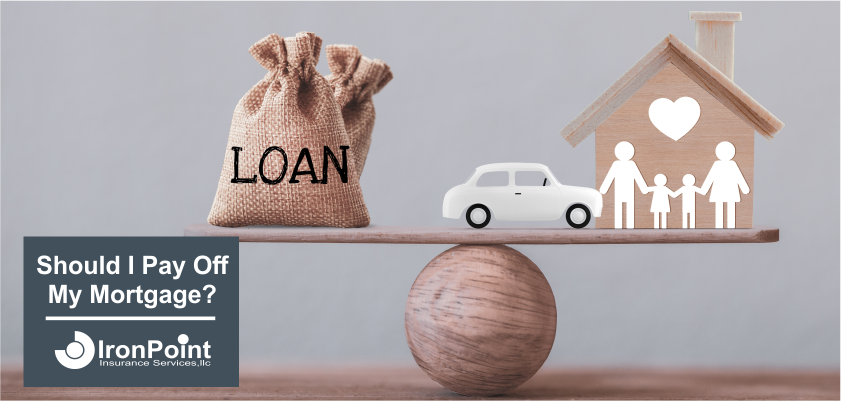Should I Pay off My Mortgage Early?

If you’re a homeowner with a mortgage you’ve wondered from time-to-time just what it would be like if you just didn’t have a monthly mortgage payment. You may be asking yourself right now, should I pay off my mortgage? Oh, what you could do with the monthly savings. Maybe to buy better home insurance? 😊
It’s an interesting question, because for most Americans, the mortgage payment is one of the largest monthly expenses. The automatic presumption is, if you could eliminate your mortgage, the monthly savings would create a surplus of extra money at the end of the month. What could you do with that extra cash? Would you save it, invest it, or maybe do some things you’ve been waiting on?
It’s certain that for some, paying of the mortgage is a dream, but is it the best solution for all homeowners? Let’s take a look at some considerations and see if paying off the mortgage is actually the right financial move for you.
Advantages of paying off your mortgage early
Don’t get us wrong, there are benefits to pay your mortgage early, and if you have the opportunity to make this choice you should consider all the benefits it may bring. For certain, the benefits will be different for everyone, but there are some universal benefits that can be considered.
Consider all the interest you can save
The single largest expense of your home mortgage is the interest paid. So, when you pay off your mortgage, while you are obviously saving the entire payment each month, what you are really netting however is the cost of the loan. The interest. In fact, the interest payments will likely cost tens of thousands of dollars over the life of the mortgage. So, the opportunity cost of the interest expense is the alternative that you could be making that money productive by investing that money elsewhere.
Sure, your mortgage interest is tax deductible, and you will lose that opportunity should you pay off your mortgage early. However, the interest savings should be more significant that the deduction benefits, and those benefits are decreasing over time as they reduce along with the balance of the mortgage as more of you payment is directed at paying off principal balance.
Owning your home provides peace of mind
While this may not be you, there are some chilling facts about retirement savings to consider. Most of us want to retire by at least age 67, but will all of us have the savings to make this happen?
A recent TD Ameritrade survey reported that adults between the ages of 40 to 79 who had at least $25,000 of investable assets concluded that nearly two-thirds of people in their 40s had less than $100,000 saved toward retirement. In fact, 28% of people in their 60s had less than $50,000. This is a startling revelation given experts typically recommend a savings of 12-times your pre-retirement savings on hand prior to retirement. That’s a large gap in retirement savings.
It doesn’t really matter how close you are to retirement; you should be closely considering this information. If you can pay off your mortgage early you will be eliminating mortgage expenses in retirement. This is not so insignificant if you are one of those who don’t have large reserves saved toward your retirement. By eliminating your mortgage expense, you can reduce your monthly expenses in retirement thereby extending the retirement resources you do have saved. If this doesn’t totally protect your lifestyle, it may just give you peace of mind in the twilight of your years.
There are disadvantages of paying off your mortgage early
As with any significant financial decision, there are pros and cons. So, let’s explore some of the drawbacks you may want to consider prior to paying off your mortgage. Sure, many of you are thinking this is a no brainer if you have the funds available. However, there are reasonable arguments against tying up so much of your resources in your mortgage.
Do you have enough retirement savings?
If you are one of the many Americans who don’t have a large retirement savings, but are considering paying off your mortgage early, you may want to re-think this plan. Why? Well, because of compound interest of course. 😊
All kidding aside, compound interest on investments is an important consideration. Compound interest is earned on both the principle and the interest in your investment account. A simple example works like this, if you contribute $6,000 per year (or $500 per month) toward your retirement account, and that account is earning 5% interest, you will have $6,300 at the end of your first year of savings.
When you start the second year, you will be beginning with $6,300 and the compounding of your earning has begun. In fact, this process will continue similarly each year assuming your remain consistent with your monthly investment and interest earned remains stable. Therefore, under our simple example, over a 30-year period you would have invested a total of $180,000 but the account’s value would be $368,634.
Alternatively, you could use that same $500 per month to pay down your mortgage, and you may be able to reduce the payments by half. The opportunity cost for you to consider in this scenario is the difference between the increased value of your home, less the interest paid, against the compounding interest in an investment account.
You may discover that you gain significantly more value from the money if you invest it in a retirement account rather than paying off your mortgage.
Have you saved your rainy day fund?
Your parents always told you to save for a rainy day, and if life has taught us anything it’s that it does rain. Saving an emergency is important. It provides reserves to replace household appliances, to sustain a financial hardship like loosing a job, or other unexpected life-events that have costs attached to them.
If you use all or a significant amount of your money to pay down your mortgage, you may not have enough left over to manage emergencies.
This doesn’t preclude you from making some early payment toward your mortgage, just make sure you also have enough set-aside for your rainy-day fund. This basic principle may serve as financial security well beyond accelerating the payoff of your mortgage.
Do you carry high-interest debt?
High-interest revolving debt is a very real problem for many Americans. While it’s true that credit-card debt has decreased over the past year, in the last 5-years it increased by 20% according to Nerdwallet.com. In June of 2020 total credit-card debt held in the United States was $413.7B.
If you are presently holding high-interest debt, like a credit card balance. It might be a better idea to use any additional monthly money to pay off these obligations before you consider paying off your mortgage.
Absence of diversification
Owning your home and maintaining a mortgage doesn’t preclude you from holding other assets. It makes sense to invest in your retirement funds or other financial instruments as you pay off your mortgage. Your home’s value is considered a stable investment, over time real estate is a predictably appreciating asset. But this doesn’t mean you shouldn’t invest in other assets and diversify your holdings. More liquid investments my prove valuable in emergency, and retirement investments receive the benefits of compounding interest we discussed earlier.
The conclusion is yours
There are pros and cons to almost every financial decision you’ll make. It’s important to evaluate your unique financial situation to determine what’s best for you. Keep in mind, even if you don’t pour every extra dollar into your mortgage, making additional payments can help you chip away at the principal amount.
If you decide to start overpaying on your mortgage, many lenders will allow you to make extra principal payments each month without penalty. By doing so, you can significantly lower your interest and even reduce the term of your loan. Be sure to ask your lender if there are any penalties or fees involved with making extra mortgage payments.
Finally, you may decide to put some extra money into your mortgage and continue to build other assets simultaneously. This strategy is less aggressive and allows you to invest in other assets to diversify your investment endeavors.
Let’s Get Started
Select the way you want to start your quote.







